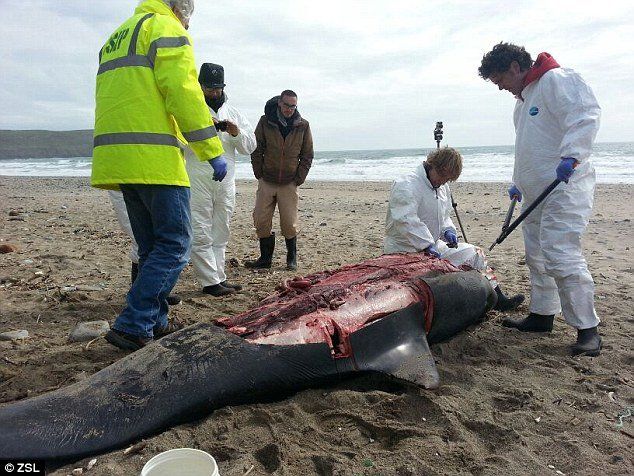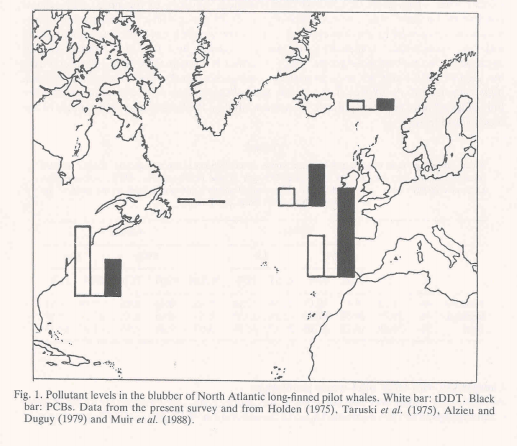Toxic Pollutants found in the Blubber of Long-finned Pilot Whales.
Organochlorine compounds are a family of synthetic chemicals that have been widely used since the mid 1940's in agriculture as pesticides and in industry for a wide variety of applications. Marine mammals accumulate organochlorine compounds through trophic webs to varying degrees, depending on the physiological and ecological characteristics of a species. Studies have shown that long-finned pilot whales which are hunted on an annual basis have these pollutants present in their tissues which may cause harm to humans who ingest their meat.
Toothed cetaceans, especially those of smaller body size feeding at the top level of the trophic web, often carry extremely high levels of xenobiotics. This is especially true for some highly persistent pollutants such as DDT (Dichlorodiphenyltrichloroethane)
and PCB (polychlorinated biphenyl). In 1987, blubber and muscle tissue were analysed for the presence of organochlorine pollutants of long-finned pilot whales ( Globicephala melas
), captured and killed in the Faroe Islands, as these represent the bulk of the tissues harvested for human consumption. The analysis examined 183 pilot whales (26 males and 157 females), focusing more on females due to reproductive transfer of chemicals from mothers to calves during gestation. Blubber samples, weighting 10kg in weight was removed from behind the pilot whales dorsal fins. It was found that because of the much higher lipid content in blubber, this tissue carries 40 - 70% more organochlorine compounds than muscle (Borell & Anguilar, 1993).
As seen below the study found that concentrations of DDT and PCB's in the blubber of pilot whales from the Faroe Islands were lower than those found in the blubber of conspecific populations of pilot whales found in other regions of the North Atlantic. Overall, pilot whales have an intermediate level of pollutants in their blubber compared with other cetaceans species found in the North Atlantic (Borell & Anguilar, 1993).
There are two explanations for this; firstly the organochlorine compounds tend to accumulate through the food web and secondly the accumulation of pollutants depends on the feeding rate of the species, which is almost proportional to its metabolic rate and therefore, inversely related to its body size. Long-finned pilot whales feed on an intermediate trophic level, on cephalopods (octopus and squid) and benthic (bottom dwelling) fish species and their body length is at an intermediate size also for cetaceans (Borell & Anguilar, 1993). However, another study showed that cephalopods from the Faroe Islands and sub- Arctic waters had higher levels of the heavy metal cadmium (Cd) compared with those of lower latitudes such as the French, Irish and British coasts. High Cd levels in cephalopods from the sub-Arctic zone correspond closely to the reported high Cd concentrations in the tissues of top vertebrate predators from the same area. Comparison of the weekly Cd intakes for the Faroe Island pilot whales with the `Provisional Tolerable Weekly Intake' for humans recommended by the World Health Organisation, showed that top vertebrate predators are often subjected to Cd doses far in excess of those recommended for humans (Bustamante et al
., 1998).
Baleen whales, on the other hand, such as fin whales (
Balaenoptera physalus
)
and minke whales ( Balaenoptera acutorostrata
)which have large body sizes and feed on planktonic crustaceans and forage fish species are found low in the food web, and so carry comparatively lower concentrations of pollutants in their tissues. At the other end of the spectrum, small cetaceans such as harbour porpoise ( Phocoena phocoena
), common dolphins (
Delphinus delphis
)
, and bottlenose dolphins (
Tursiops truncatus
)
have a small body size and typically feed at higher trophic levels and carry much higher levels of DDT and PCB than pilot whales found in the same region (Borell and Anguilar, 1993).
References:
Borell and Anguilar, (1993). DDT and PCB pollution in the blubber of and muscle of long-finned pilot whales from the Faroe Islands. Reports of the International Whaling Commission.
Special Issue, 14.
Bustamante, P., Caurant, F., Fowler, S.W., Miramand, P., (1998). Cephalopods as a vector for the transfer of cadmium to top marine predators in the north-east Atlantic Ocean, Science of The Total Environment
, Volume 220, Issue 1,Pages 71-80,
SHARE THIS ARTICLE















